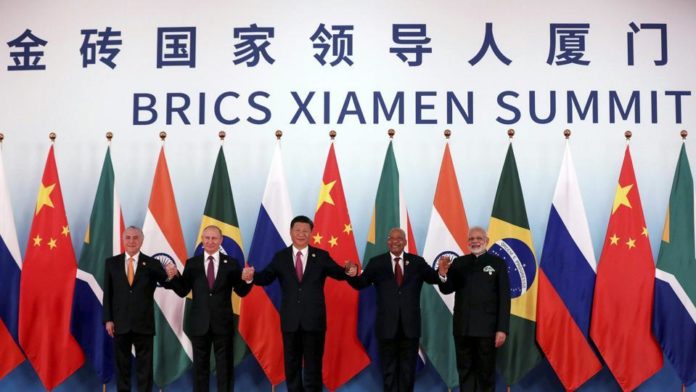The Brics grouping on Monday bracketed Pakistan-based Lashkar-e-Taiba and Jaish-e-Mohammed with global terror groups Islamic State and al-Qaeda, marking a significant diplomatic win in India’s efforts to counter cross-border terrorism.
Prime Minister Narendra Modi joined Chinese President Xi Jinping, Russian President Vladimir Putin, Brazilian President Michael Temer and South African President Jacob Zuma condemned terror attacks worldwide and said those “committing, organising or supporting” such acts must be held accountable.
This is the first time anti-India groups such as LeT and JeM have been named in a Brics declaration though the five-country grouping has denounced terror in the past. In the run-up to the summit in Xiamen, China’s foreign ministry had even suggested the counter-terror efforts of its “iron brother” ally Pakistan would not be an appropriate topic for discussion.
The 43-page Xiamen declaration, with 17 references to terrorism, made it clear that India had been able to convince others in the grouping about the threat posed by Pakistan-based organisations as the document also contained references to groups such as the Haqqani Network, Eastern Turkistan Islamic Movement and Pakistani Taliban that have targeted Afghanistan and China.
“We deplore all terrorist attacks worldwide, including attacks in Brics countries, and condemn terrorism in all its forms…,” said the declaration released after the plenary session of the 9th Brics summit.
“We…express concern on the security situation in the region and violence caused by the Taliban, ISIL/DAISH, Al-Qaida and its affiliates including Eastern Turkistan Islamic Movement, Islamic Movement of Uzbekistan, the Haqqani Network, Laskar-e-Taiba, Jaish-e-Mohammad, TTP and Hizb-ut-Tahrir,” it said.
The document did not specify which region it was referring to but added: “We reaffirm that those responsible for committing, organizing or supporting terrorist acts must be held accountable.”
Monday’s statement was a marked departure from earlier Brics statements – the declaration issued after last year’s summit in Goa referred to terrorism several times but only named one group, the Islamic State.
There have been reports that cadres of the ETIM, which China accuses of fomenting terrorism in its restive Xinjiang Uyghur Autonomous Region, have been trained in Pakistan’s tribal belt.
“For the first time (in a Brics declaration), there has been a specific listing of terror organisations,” Preeti Saran, joint secretary (east) in the external affairs ministry, told a media briefing.
Saran did not respond to a question on whether the naming of JeM as a terror group by Brics would lead to its chief, Masood Azhar, being sanctioned by the UN Security Council.
Though the language of the statement is explicit, it remains to be seen whether China – which has repeatedly blocked India’s attempts to get Azhar designated a terrorist at the UN – decides to support that move.
Later on Monday, China said Pakistan-based groups such as JeM, LeT and the Haqqani Network were included in the Brics declaration because of concerns about their violent activities in the region. Defending the move to include them in the declaration for the first time, foreign ministry spokesman Geng Shuang said Brics countries have “shown their concerns to the violent activities raised by these organisations”.
“These organisations are all sanctioned by the UN Security Council and have a significant impact for (the) Afghanistan issue,” Geng said. He skirted a question on whether the naming of JeM by Brics marked a change in Beijing’s stand of opposing a UN ban on its chief Masood Azhar.
Saran too didn’t explain what convinced China to allow the LeT and JeM to be named in the declaration. Indian diplomats said the document, which came a week after India and China resolved a military standoff at Doklam near the Sikkim border, vindicated India’s consistent stand on terrorism.
Saran also didn’t respond to a question linking the resolution of the Doklam standoff to the statement. Brics is a multilateral forum, Saran said, declining to offer any comment.
The terror aspect of the declaration showed that countries now agree the menace needs to be tackled. “Terrorism is a scourge that has to be addressed by the entire international community. You cannot have double standards in tackling terrorism. You cannot have good (or) bad terrorism,” Saran said.
Saran said leaders of all Brics states had endorsed the declaration, indicating the consensus on terrorism. She added the statement was agreed on after several rounds of negotiations and deliberations.
The statement also called on the world community to adopt a comprehensive approach to combat terrorism, including the countering of radicalization, recruitment, movement of terrorists and foreign fighters, blocking sources of terror financing such as money laundering and drug trafficking, dismantling terror bases, and countering the misuse of the internet and social media by terrorist entities.

Readers like you, make ESHADOOT work possible. We need your support to deliver quality and positive news about India and Indian diaspora - and to keep it open for everyone. Your support is essential to continue our efforts. Every contribution, however big or small, is so valuable for our future.











